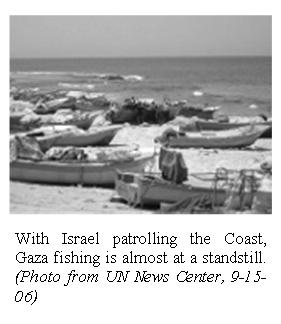The Gaza Story
 Occupied by the Israelis since the 1967 Arab/Israeli war, the Gaza strip is surrounded by a wall on three sides and the Mediterranean on the fourth. With a land mass of 140 square miles and a population of almost 1.5 million, it is one of the most densely populated areas in the world. It is also one of the poorest.
Occupied by the Israelis since the 1967 Arab/Israeli war, the Gaza strip is surrounded by a wall on three sides and the Mediterranean on the fourth. With a land mass of 140 square miles and a population of almost 1.5 million, it is one of the most densely populated areas in the world. It is also one of the poorest.
Some 50%-75% are unemployed. About 85% receive food assistance from the UN’s Relief and Works Agency. One million (two-thirds of the population) are registered with the UN as refugees. The poverty rate now soars between 60% and 80%, a two– to four-fold increase over what it was in 2000.
Among the factors contributing to the economic crisis have been:
- The unrelenting rise of the Israeli and US right;
- The collapse of the Oslo peace process, where the US and Israel tried to impose impossible conditions on all Palestinians living in the occupied territories;
- Ariel Sharon's armed march on the al-Aqsa Mosque in Jerusalem, a deliberate provocation sparking the second intifada (the Palestinian rebellion against the occupation) and brutal reprisals from Israel;
- The disempowerment and corruption of Arafat's Fatah party, followed by Arafat's death and the rise to power of the Sunni fundamentalist party, Hamas;
- And not least of all, Ariel Sharon's “disengagement” plan in 2005, which promised freedom by removing Israeli settlers and soldiers from Gaza.
Disengagement
There was a brief sigh of relief after Israeli soldiers and settlers left Gaza, until Sharon declared that, in withdrawing, Israel was absolving itself of any further financial responsibility for the well-being of Gaza's residents, and the military withdrawal turned out to be a redeployment.
Troops moved from inside Gaza to outside the wall, where they guarded the gates, controlling passage of people and goods in and out. With frequent closures, it was often impossible for residents to cross into Israel and the West Bank to find employment, to market their produce, to maintain family ties. Recent closures this summer alone caused 68,000 people to lose their jobs. It was also often impossible to import food, medical supplies, and essential goods. Food lay rotting outside the gates. Inside it was necessary to institute food rationing. Some died because they could not get medical treatment.
The UN warned the world about the collapse of Gaza's economy. Report after report likened Gaza to a prison.
Violence erupted, with Hamas firing rockets into Israeli civilian areas, and Israel, buttressed by US aid and moral support, retaliating with far greater force. The Israeli human rights group B'tselem has compiled a long list of Israeli violations of international law in Gaza. One of the most disturbing was the practice of night flights over Gaza which filled the air with sonic booms for hours, terrorizing the civilian population, especially the children. There was massive destruction of bridges and roads. The largest electric power plant was destroyed, leaving Gaza with a serious water shortage, since there wasn't electricity to run water pumps.
US Role
For decades the US has been a major player in the Israeli/Palestinian conflict, and the story of the Gaza “disengagement” is no exception.
Last month, the former head of the World Bank and former envoy to Israel James Wolfensohn told the Israeli newspaper Ha'aretz that Israel, prodded by Elliott Abrams, has systematically violated its commitments under the disengagement plan. And, according to Ha'aretz, in April of 2004 Bush and Sharon agreed that, in exchange for disengagement in Gaza, Israel could take land from the West Bank by adjusting the borders.
But perhaps the most telling analysis of the meaning of disengagement and the role of the US was made by Dov Weisglass, Sharon's senior political advisor, as reported in Middle East Report Online on 10/14/04:
“The significance of the disengagement plan is the freezing of the peace process. And when you freeze that process, you prevent the establishment of a Palestinian state, and you prevent a discussion on the refugees, the borders and Jerusalem. Effectively, this whole package called the Palestinian state, with all that it entails, has been removed indefinitely from our agenda. And all this with...a presidential blessing and the ratification of both houses of Congress. The disengagement is actually formaldehyde. It supplies the amount of formaldehyde that is necessary so there will not be a political process with the Palestinians.”
The complete Middle East Report Online article.
June 15, 2007 "Democracy Now" program, on Gaza and its impeding humanitarian crisis and the US/Israeli arming of Fatah and the "Palestinian Contras."